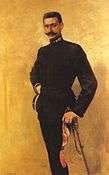Pavlos Melas
| Pavlos Melas Παύλος Μελάς | |
|---|---|
 | |
| Nickname(s) | Mikis Zezas (Μίκης Ζέζας) |
| Born |
1870 Marseille, France |
| Died |
1904 (aged 34) Statista, Kastoria (Macedonia) |
| Allegiance |
|
| Years of service | 1891-1904 |
| Rank | Captain |
| Battles/wars | Greek Struggle for Macedonia |
Pavlos Melas (Greek: Παύλος Μελάς, Pávlos, i.e., Paul, Melás) (March 29, 1870 – October 13, 1904) was an officer of the Hellenic Army, and he was among the first who organized and participated in the Greek Struggle for Macedonia.
He was born in Marseilles, France, the son of Michail Melas who was elected MP for Attica and mayor of Athens and brother of Vassileios Melas who was also an officer of the Hellenic Army. His father, a wealthy merchant, was of Epirote origin.[1] At an early age Pavlos moved to Athens to study, and later joined the Army, graduating from the Hellenic Army Academy as an artillery lieutenant in 1891. In 1892, he married Natalia Dragoumi, the daughter of Kastorian politician Stephanos Dragoumis and sister of Ion Dragoumis. In 1895, the couple had a son named Michael and a daughter, Zoe.
Melas, with the cooperation of his brother-in-law Ion Dragoumis, the consul of Greece in the then Ottoman occupied Monastir (now Bitola), Christos Kottas,and Germanos Karavangelis, metropolitan bishop of Kastoria, tried to raise money for the economic support of Greek efforts in Macedonia. After the Ilinden-Preobrazhenie uprising, he decided to enter Macedonia in June 1904, to assess the situation and to see if there is any possibility of establishing a military unit to fight the Bulgarians (Internal Macedonian Revolutionary Organization, VMRO) and the Ottoman Turks.
In July 1904 (under the alias Captain Mikis Zezas), he reentered Macedonia with a small unit of men and fought against the VMRO until October 13, 1904 when he was killed after being surrounded by Ottoman forces in the village of Statista. The village with coordinates 40° 42' N 021° 16' E has been renamed Melas in his honour, after joining Greece.
After his death, Greek efforts became more intense, resulting in the interception of Bulgarian Komitadji efforts, especially in West and Central Macedonia, which joined Greece after the Balkan Wars.
He is considered to be a symbol of the Greek Struggle for Macedonia and many of his personal belongings can be seen in the Museum of the Macedonian Struggle in Thessaloniki and Pavlos Melas Museum in Kastoria.
Gallery
- A photograph of Pavlos Melas as a Lieutenant in the Greek Army.
 Pavlos Melas as a Lieutenant in the Greek Army. Portrait by Georgios Jakobides.
Pavlos Melas as a Lieutenant in the Greek Army. Portrait by Georgios Jakobides. Postcard with the last words of Melas "Leave no Bulgarians".
Postcard with the last words of Melas "Leave no Bulgarians".
References
- ↑ George C. Papavizas (2006). Claiming Macedonia: The Struggle for the Heritage, Territory and Name of the Historic Hellenic Land, 1862-2004. McFarland. p. 58. ISBN 978-1-4766-1019-1.
External links
| Wikimedia Commons has media related to Pavlos Melas. |
- Museum of the Macedonian Struggle, Thessaloniki
- Pavlos Melas Museum, Kastoria
- Photographs from the website of the Hellenic army academy including one of Melas with his family
